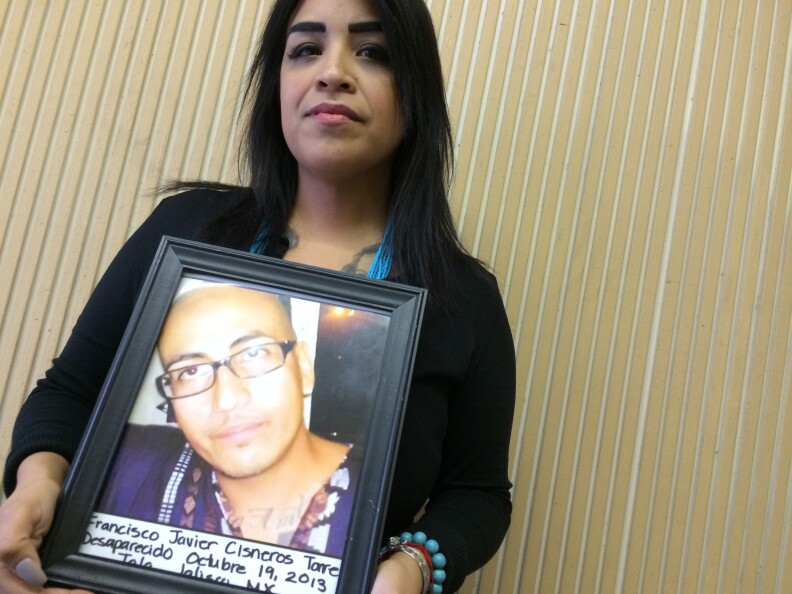Against the backdrop of missing people in Mexico, a Los Angeles woman has been searching for her brother who disappeared more than a year ago in Jalisco, just one example of thousands of relatives who are dealing with the frustration of seeking answers and finding none.
Nansi Cisneros spends most of her time traveling between Mexico and L.A. trying to discover what happened to her younger brother, Javier, who disappeared in October 2013.
"You walk in and everyone is broken, everyone is destroyed," said Cisneros, on seeking her family the day after her brother went missing. "You can't even ask how you feel because you don't want to know the answer."
Cisneros' situation echoes that of relatives in the ongoing case of the 43 students who disappeared in Mexico last September, sparking protests on both sides of the border. (Cisneros' brother is not one of the 43.)
A phone call, a sudden change
Nansi Cisneros grew up in L.A., taking classes at Santa Monica College and dreaming of studying literature. Life changed the night she got the call saying her younger brother in Mexico had been taken by armed men after a bloody struggle outside their Jalisco home.
So desperate was Nansi's mother not to lose her child, she pleaded with the intruders to kill her son on the spot so she could keep his body and bury him. This was better than seeing her boy disappear into the unknown.
The cries of a mother did nothing. The gunmen bundled her son into a car. He's been missing ever since.
"At that moment, everything around me, my world, just crumbled," said Nansi Cisneros of getting the call. "I just wanted to be there. I wanted to close my eyes and be next to my mom."
She left L.A. by plane that night and arrived at her family's home in Tala, Jalisco, hours later. She found a household deeply traumatized by the events, still struggling to make sense of the sudden loss.
Javier Cisneros is one of thousands in Mexico whose disappearances remain unsolved. Recently, the case of 43 missing students in the state of Guerrero prompted widespread protests throughout Mexico and in some U.S. cities.
It has also presented Mexico's Enrique Peña Nieto with the deepest challenge of his two-year-old presidency by highlighting a problem the country has been grappling with for years.
More than 26,000 people went missing in Mexico from 2006-2012, according to the Mexican government. In December, Peña Nieto announced a plan to reform the justice system and put local law enforcement under federal control. But there are questions about close ties between government officials and drug cartels.
A 2013 study looking at 152 incidents of missing persons found evidence of government involvement in over half of the cases.
Civilian forensic team
"We don't trust the government," said Graciela Perez Rodriguez, who helps run a citizen-led forensic team from her home in San Luis Potosí, north of Mexico City.
So far the group, called Ciencia Forense Ciudadana, has registered some 300 families in Mexico, said Rodriguez, including families of the missing students from Iguala, Guerrero. It gathers evidence and tracks clues to the cases.
"If we waited for them [the government] to do something, there would be nothing," said Rodriguez. "Your family member will remain a piece of paper at the public prosecutor's office."
Meanwhile, Nansi Cisneros and her family continue their search for Javier nearly 15 months after his disappearance.
Javier's case remains open and ongoing, according to the Fiscalía General del Jalisco, or the State Prosecutor's Office in Jalisco, who provided a written confirmation of his date of disappearance and tracking number.
Reached by phone, local investigators in Tala declined to provide details of the case to KPCC, citing privacy concerns.
The Mexican Consulate in Los Angeles said it only pursues cases of Mexican nationals who go missing within the U.S. and is not aware of Javier's specific case.
Nansi Cisneros said her family has gotten multiple threats by phone since she started pursuing the case. But she said that she plans to continue pushing.
"This situation is bigger than my brother. It's bigger than my family," said Cisneros. "We have a lot of people missing, so it's about finding everyone."



